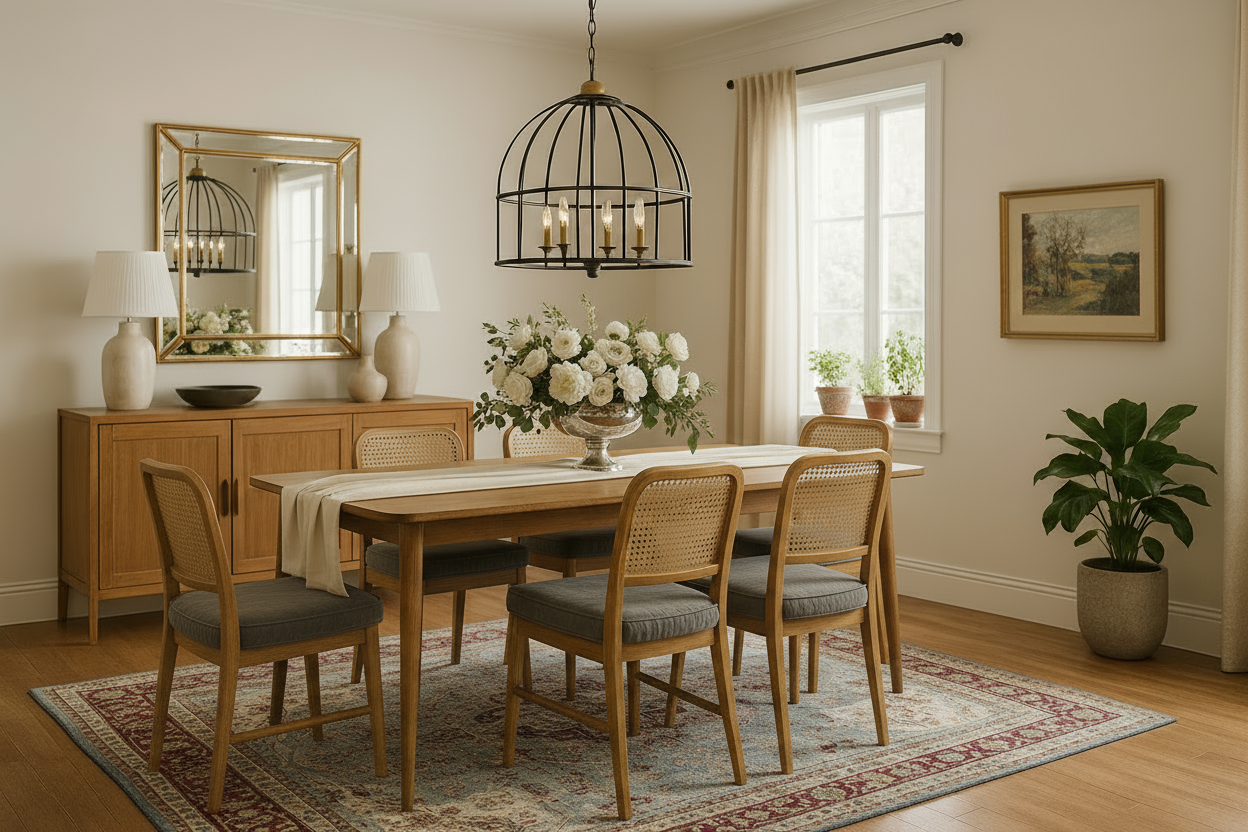The dining room is more than just a place to eat — it’s where people gather, connect, and create memories. Whether you’re hosting dinner parties, enjoying a quiet breakfast, or helping with homework at the table, your dining room should feel both functional and beautiful.
In this article, you’ll learn how to decorate a dining room that balances comfort, style, and versatility.
1. Choose the Right Table for the Space
The dining table is the heart of the room. Choose a size and shape that fits your space and your lifestyle.
- Rectangular tables: Great for longer rooms or larger groups
- Round tables: More intimate and space-saving
- Extendable tables: Offer flexibility for guests and everyday use
- Glass tables: Help small rooms feel open and airy
- Wooden tables: Bring warmth and timeless appeal
Tip: Leave at least 90 cm (36 inches) around the table for comfortable movement.
2. Mix and Match Chairs for Personality
Matching dining sets aren’t your only option. Mixing chair styles adds charm and personality.
- Use end chairs that differ from side chairs (e.g., armchairs at the head)
- Mix colors or materials for an eclectic look
- Try bench seating on one side to save space
- Upholstered chairs add softness and comfort
Just keep some design element consistent — like color tone or leg shape — to maintain cohesion.
3. Add a Statement Light Fixture
Lighting sets the tone for your dining room experience.
- Hang a chandelier or pendant light centered over the table
- Use a dimmer switch to control brightness for mood
- Choose fixtures that complement your decor — modern, rustic, vintage, or industrial
- Make sure the light is scaled appropriately to your table size
Guideline: The fixture should hang about 75–90 cm (30–36 inches) above the table.
4. Use a Rug to Ground the Space
A rug can define your dining area, especially in open-concept homes.
- Choose a rug large enough that chairs stay on it, even when pulled out
- Go for low-pile or flatweave materials for easier cleaning
- Pick a pattern or color that complements your decor
- Avoid rugs that are too small — it will make the space feel cramped
Rugs add warmth, texture, and a sense of place.
5. Add a Functional Sideboard or Buffet
Storage is key — especially for entertaining.
- Use a sideboard, buffet, or console table for serving and storage
- Store table linens, dinnerware, or wine bottles
- Decorate the top with art, plants, or a lamp
- Consider a bar cart for a touch of elegance and convenience
Furniture pieces like these add both function and style.
6. Choose a Cohesive Color Palette
Color affects how a room feels — and how food looks!
- Warm tones (like terracotta, mustard, olive green) feel cozy and inviting
- Cool tones (like gray, navy, sage) offer elegance and calm
- Neutrals are timeless and pair well with bold accent colors
- Add pops of color through art, cushions, or fresh flowers
Bonus: Deep colors like navy or charcoal can make dining rooms feel intimate and sophisticated.
7. Use Wall Decor to Add Interest
Bare dining room walls can feel cold or unfinished.
- Hang a large mirror to reflect light and expand the space
- Use artwork or photography that complements your style
- Try a gallery wall, floating shelves, or wall paneling
- Add a chalkboard wall for menus, quotes, or fun messages
The right wall decor personalizes your space.
8. Decorate the Table — But Keep It Simple
Even when you’re not hosting, your table can look styled.
- Use a centerpiece like a vase with seasonal flowers or greenery
- Add candles, a tray, or a sculptural bowl
- Don’t overcrowd — leave space for daily use
- For a casual look, skip the tablecloth and use placemats or runners
Change it up seasonally or for special occasions.
9. Add Texture for Warmth
Texture brings depth and comfort to the room.
- Mix wood, metal, linen, and glass
- Use woven chairs, ceramic decor, or textured napkins
- Layer textiles like runners, cushions, or curtains
The more sensory variation, the cozier the space feels.
10. Don’t Forget the Atmosphere
Small details complete the experience.
- Light candles or use scent diffusers during meals
- Add soft background music for ambiance
- Keep lighting warm and inviting
- Maintain a clutter-free space for easy transitions between meals and relaxation
These final touches turn meals into meaningful moments.
Final Thoughts: Where Style Meets Connection
Your dining room should reflect how you live and gather — whether it’s daily meals with family or hosting friends on the weekend. With thoughtful choices in lighting, layout, color, and decor, you can create a dining space that’s equal parts stylish, practical, and welcoming.
The goal isn’t perfection — it’s connection. Design your dining room to serve you and the people you love.
